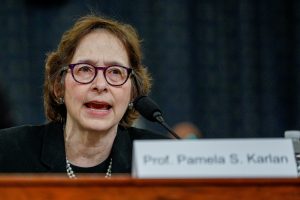Dear Friends,
Today, in our series honoring women on the eighth of every month, we would like to bring to your attention Pamela Karlan who testified on December 4, 2019, in the House of Representatives Judiciary Committee.
Pamela Susan Karlan
 © TOM BRENNER / REUTERS stock.adobe.com
© TOM BRENNER / REUTERS stock.adobe.com
Pamela Karlan is now widely known for her appearance in the House of Representatives’ Judicial Committee Impeachment Hearing on December 4, 2019. But who is Pamela Karlan?
Pamela Karlan is law professor at Stanford Law School. Before joining the Stanford faculty, Karlan was a professor of law at the University of Virginia School of Law (1988-1998). She also served as a law clerk for Judge Abraham D. Sofaer (U.S. District Court for the Southern District of New York) in 1984-1985 and then clerked for Justice Harry A. Blackmun (U.S. Supreme Court). As clerk for U.S. Supreme Court Justice Harry Blackmun, she primarily wrote his dissent in Bowers v. Hardwick.
Pamela Karlan was born in February of 1959. She received her BA in history from Yale University in 1980. She went on to earn her MA in history and J.D. (Doctor of Jurisprudence degree) from Yale Law School in 1984. She is currently a member of the American Academy of Arts and Sciences, the American Academy of Appellate Lawyers, and the American Law Institute.
Pamela Karlan is a leading legal scholar on voting rights and political process. From 2014 to 2015, she served as United States Assistant Attorney General for Voting Rights in the United States Department of Justice Civil Division. She has also served as a commissioner on the California Fair Political Practices Commission, as an assistant counsel for the NAACP Legal Defense Fund, and a Deputy Assistant Attorney General in the Civil Rights Division of the United States Department of Justice where she was part of the group responsible for implementing the Supreme Court’s decision in United States vs Windsor. (The Court held that Section 3 of the Defense of Marriage Act (DOMA), which denied federal recognition of same-sex marriages, was a violation of the Due Process Clause of the Fifth Amendment.)
She is currently co-director of the Stanford’s Supreme Court Litigation Clinic, which she co-founded in 2004. In this clinic, students litigate live cases before the court. She has co-authored leading casebooks on constitutional law, constitutional litigation, and the law of democracy, as well as numerous scholarly articles.
It is good to know that competent and committed women are more and more influencing the decisions we make as a Country and World. The Interfaith Peace Project continues to support and encourage women’s leadership and influence in all the affairs of life.

Off